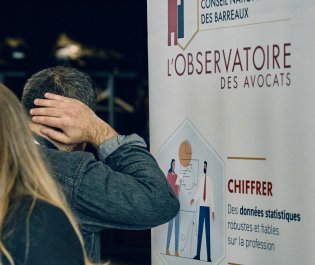Professional Regulations - Obligations
The oath taken by all French lawyers before practicing their profession is the basis of French legal ethics: "I swear, as a lawyer, to perform my duties with dignity, conscience, independence, integrity, and humanity".
Ethics
Thus, lawyers must follow a certain number of juridical and ethical rules in their professional and extraprofessional relationships.
- The principle of independence guarantees that the advice lawyers give to their clients will never be guided by personal interest or external pressure.
- The principle of loyalty means that lawyers may not advise or defend two parties whose interests might conflict (the conflict of interest rule).
- The principle of confidentiality covers verbal or written communications between lawyers and their clients, and between lawyers and their district bar association president, except for any information they may have acquired during exchanges with the opponent.
- Respect for professional secrecy prohibits lawyers from revealing to third parties any confidences or secrets they may receive from their clients. This is overarching, absolute, and not limited by time;it applies to all legal matters and in all their areas of application, such as advising, defense, etc. In addition to an ethical obligation, compliance with professional secrecy is a legal obligation, and violating it is a criminal offense.
Disciplinary Proceeding
When lawyers violate their ethical and professional obligations, they are not only criminally liable, but also subject to disciplinary sanctions ranging from warnings, through temporary suspension of the right to practice, to disbarment. Act 2004-130 of February 11, 2004 and Decree 2005-531 of May 24, 2005 establish the rules of disciplinary procedure.
The prosecuting authority is the President of the association, who receives the complaints, and, if necessary, handles them by conducting an ethics-based inquiry into the alleged facts, or the Attorney General of the Court of Appeal.
The prosecuting authority may proceed to close the case, or issue a private reprimand;or, if the facts are proven, the authority may immediately, or after an ethics investigation, pass the case on to the disciplinary council that holds first-instance hearings on the infractions committed by the lawyers who belong to the bars located there. Only the Council of the Paris Bar Association has retained its prerogatives in his area.
Continuing Education
Act of February 11, 2004, besides amending the regulations for professional education, made some changes in the structure of continuing education for attorneys.
Continuing education has been mandatory since 2004. All lawyers are required to take 20 hours of training every year.
Bars are responsible for overseeing this obligation, and they may take disciplinary measures against lawyers who fail to comply.
In April 2008, the Conseil national des barreaux a signed a mutual recognition agreement with Italy's Consiglio Nationale Forenze;thereby giving French and Italian lawyers the option of validating the hours of continuing education they take in either country.
Handling of CARPA Funds
No income that lawyers receive from their clients or adversaries when acting as representatives or assistants in professional, judicial, or legal acts on behalf of their clients, devolves to them;it should be deposited in a special independent bank account, regulated and managed by the Lawyers' Financial Settlements Fund (CARPA).
This is both a legal obligation and an essential guarantee for their clients.
There are strict controls on how the funds deposited in the CARPA are handled;these controls involve security, transparency, and the origin of the money, with an emphasis on preventing money laundering.
Professional Liability Insurance
Lawyers' activities are covered by mandatory liability insurance, and this constitutes a significant guarantee for their clients.
Being a Lawyer in France: Professional Regulations - Obligations
Professional liability insurance covers any errors that lawyers may commit that could cause damage or a missed opportunity to their clients or third parties, for example, missing a deadline for undertaking a process or action, or filing an appeal.
Mandatory insurance is also purchased to cover money entrusted to lawyers and deposited in CARPA accounts.
Social Coverage and Pension Funds
Professionals who work for themselves are responsible for their own social security premiums, as well as those of any employees. These include their contributions for health insurance, old age pensions, family allowances, and retirement.
- Payments for health insurance are mandatory, and they cover sickness, maternity, and disability insurance.
- Contributions for old age insurance are mandatory, and attorneys make these payments to the National French Bar Association Fund (CNBF).
- Family allowance contributions are mandatory and must be paid into the URSSAF.
In addition, there are membership dues for their bar associations and the Conseil national des barreaux.
